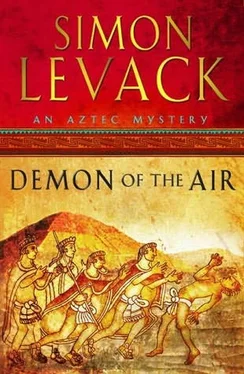Simon Levack - The Demon of the Air
Здесь есть возможность читать онлайн «Simon Levack - The Demon of the Air» весь текст электронной книги совершенно бесплатно (целиком полную версию без сокращений). В некоторых случаях можно слушать аудио, скачать через торрент в формате fb2 и присутствует краткое содержание. Год выпуска: 2012, Издательство: St. Martin, Жанр: Исторический детектив, на английском языке. Описание произведения, (предисловие) а так же отзывы посетителей доступны на портале библиотеки ЛибКат.
- Название:The Demon of the Air
- Автор:
- Издательство:St. Martin
- Жанр:
- Год:2012
- ISBN:нет данных
- Рейтинг книги:4 / 5. Голосов: 1
-
Избранное:Добавить в избранное
- Отзывы:
-
Ваша оценка:
- 80
- 1
- 2
- 3
- 4
- 5
The Demon of the Air: краткое содержание, описание и аннотация
Предлагаем к чтению аннотацию, описание, краткое содержание или предисловие (зависит от того, что написал сам автор книги «The Demon of the Air»). Если вы не нашли необходимую информацию о книге — напишите в комментариях, мы постараемся отыскать её.
The Demon of the Air — читать онлайн бесплатно полную книгу (весь текст) целиком
Ниже представлен текст книги, разбитый по страницам. Система сохранения места последней прочитанной страницы, позволяет с удобством читать онлайн бесплатно книгу «The Demon of the Air», без необходимости каждый раз заново искать на чём Вы остановились. Поставьте закладку, и сможете в любой момент перейти на страницу, на которой закончили чтение.
Интервал:
Закладка:
“Did it work?” The eagerness in the litter bearer’s voice told its own story.
“Work? It was like walking around with a lump of hardwood between my legs! I never even had to use it all. Probably still got some, somewhere.”
I could not believe even Rabbit was stupid enough to fall for a simple ruse like this, but he was obviously desperate. “I don’t suppose it still works, though,” he said nonchalantly.
“Oh, I should think it’s gone off by now,” the old slave agreed. “And it probably never would have worked in the first place unless you invoked the right gods when you took it. It wouldn’t be muchuse to me now, anyway! But if you had still been having problems-well, I’m just glad to hear you aren’t.”
There was a long, awkward silence. Then Rabbit said nervously: “Look … I mean … I’m fine now, no problem at all, but if it ever came back, well …”
“Actually, come to think of it, the stuff might even be poisonous by now. No, forget I mentioned it ….”
“How much do you want for it?”
“I wouldn’t dream of selling it to you.”
“How much?” Rabbit demanded again, this time with an edge to his voice.
Costly sighed. “I told you, I can’t sell it to you. But look, at your own risk …” I could not see what he was doing in the darkness of his corner of the room but I could hear him rummaging for something beside his sleeping mat, followed by the faint sloshing of liquid in a gourd. “I’ll give it to you. But I really think …”
“Thanks!” Rabbit almost snatched the gourd from him. “If this works, I owe you one!”
A moment later he was gone and the old slave’s body was heaving up and down on his mat in time to his convulsive wheezing laughter.
“Was that what I thought it was?” I said.
His mirth brought on a fit of coughing. “That moron!” he spluttered when he could draw breath. “He’ll drain it to the dregs! By midnight his bowels will be flowing like the aqueduct! You’ve got all the time you need, now.” The laughter overcame him again. “Oh dear!”
I like to remember Costly that way-laughing so much he could hardly breathe.
It helps me to forget what happened afterward.
7
It was easy to work out where they had taken the corpse from the canoe. My master would not want to be concerned with it, and the steward had neither the brains nor the imagination to do anything other than the obvious.
I could assume it would not be left where it was. The obvious thing to do with the body was to move it before it stiffened, but it could not be taken far in the middle of the night. In any case, I thought, my master and his steward could have no idea where to take it, unless they knew where the dead man’s family was or who his friends had been. They would have had it carried as short a distance as possible and left somewhere convenient, from where it could be got away from the house as soon as the Sun came up.
Few households were ostentatious enough to have torches burning through the night, but my master’s was one of them. I took one and hurried to the front of the house, to the room where the litters were kept, near the foot of the broad steps up to the patio.
As I ducked through the entrance, I realized that the steward had not let me down. The body was there. In fact, as I straightened up, I saw that it was altogether too much there. Lifting the torch, I saw the dead man’s shadow projected, much larger than life, against the far wall, hunched over the angular shape of a litter. Not even the torch’s flickering, however, could account for the way the shadow flowed and changed shape as the corpse got to its feet.
I dropped the torch, which fell at my feet, turning the dead man’s shadow into a dark streak that shot up the far wall until it loomed over me. The torch went out. It did not matter: there was already one burning in the wall above my head. I stepped back, my hands gropingbehind me, looking for the doorway. The moment I found it, I intended to run.
Then the dead man spoke.
“S-sorry. I shouldn’t be here. I’ll go now.”
It was the voice of the young priest, one of the pair that had brought the body out of the water. As soon as I heard him I made my eyes take a fresh look at the scene in front of them.
The dead man cast no shadow to speak of. It was the priest who had frightened me, suddenly getting up from where he had been squatting by the litter because he was as startled as I was. The corpse sat in the litter itself, propped against the tall wicker back of its chair, looking quite peaceful apart from the hideous gash at his throat and the way his jaw hung slack and open. He was still naked. Surrounded by the heron feathers and paper streamers that decked my master’s plainest litter, and swaddled in the rabbit’s fur covering its chair, he looked more pathetic than when he had just been pulled out of the canal.
I bent down to retrieve my torch. It was just as well it had gone out. Otherwise it might have set fire to something. Any of the embroidered cotton canopies resting against the walls, or the shining blue and green feathers that bordered them, some as long as my arm, could have caught in an instant.
I studied the priest. As light and shadow danced around and behind him his soot-stained face remained uniformly dark. Watching his eyes shift from side to side as he sought a way around me to the door, I had the unsettling feeling that I might have met him before that night.
“Who are you?” I asked.
“My name’s Heart of a God,” he replied. There was no tremor in his voice. Instead there was an unnatural stillness, a conscious control that betrayed his fear as eloquently as if he had been begging for mercy. He seemed even younger than when we had spoken by the side of the canal. He had been right: he should not be here. He should be in the Priest House or watching over a temple fire and offering his blood to the gods.
I asked the obvious question.
Realizing he was not going to get past me, he seemed to relax a little. “I was curious.” He indicated the body. “About him.”
I took a step toward him and grinned. “That makes two of us!”
The priest moved aside to give me a closer look at the corpse, and hovered over my shoulder as I examined it. It occurred to me afterward that he could easily have got to the door then, had he chosen to.
After a few moments he said: “It’s the wounds, isn’t it?”
I grunted assent. I was looking at the neck, probing the edges of the gash with my finger. The skin around it was cold and unyielding and dry, as if there was no blood left in the body.
“This would have killed him, no doubt about that. I wonder what it was?”
“A sword?” he hazarded.
“Maybe. It’s a very clean cut-too clean for a flint knife. It must be obsidian.” That would argue for its having been a sword, I knew, a flat shaft of fire-hardened oak with rows of obsidian blades set into its edges. “It’s quite shallow, though, isn’t it?” I imagined a sword swishing through the air and slicing through a neck or a limb at the bottom of its arc. “I think it was a knife or a razor. A sword blow would have taken his head off.”
“Not if whoever was using it didn’t have much space to swing it in.”
I glanced back at the young priest peering eagerly over my shoulder. I had been right to think he was no fool, I thought, but his brains were going to get him into trouble one day.
“You’re right,” I said. “So either it was a knife-made of something sharper than flint-or he was killed in a cramped space. Or both. No reason why it can’t have been both. The less space you have to work in, the more likely you are to prefer a knife.” I tried to imagine the cramped spaces I knew: small rooms, steam baths, the niches at the backs of temples. If you were going to murder somebody it made sense to do it somewhere enclosed and private.
Читать дальшеИнтервал:
Закладка:
Похожие книги на «The Demon of the Air»
Представляем Вашему вниманию похожие книги на «The Demon of the Air» списком для выбора. Мы отобрали схожую по названию и смыслу литературу в надежде предоставить читателям больше вариантов отыскать новые, интересные, ещё непрочитанные произведения.
Обсуждение, отзывы о книге «The Demon of the Air» и просто собственные мнения читателей. Оставьте ваши комментарии, напишите, что Вы думаете о произведении, его смысле или главных героях. Укажите что конкретно понравилось, а что нет, и почему Вы так считаете.












